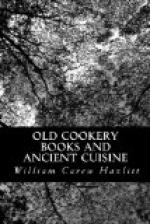Of the dishes which have been specified, the froise corresponded to an omelette au lard of modern French cookery, having strips of bacon in it. The tansy was an omelette of another description, made chiefly with eggs and chopped herbs. As the former was a common dish in the monasteries, it is not improbable that it was one grateful to the palate. In Lydgate’s “Story of Thebes,” a sort of sequel to the “Canterbury Tales,” the pilgrims invite the poet to join the supper-table, where there were these tasty omelettes: moile, made of marrow and grated bread, and haggis, which is supposed to be identical with the Scottish dish so called. Lydgate, who belonged to the monastery of Bury St. Edmunds, doubtless set on the table at Canterbury some of the dainties with which he was familiar at home; and this practice, which runs through all romantic and imaginative literature, constitutes, in our appreciation, its principal worth. We love and cherish it for its very sins against chronological and topographical fitness—its contempt of all unities. Men transferred local circumstances and a local colouring to their pictures of distant countries and manners. They argued the unknown from what they saw under their own eyes. They portrayed to us what, so far as the scenes and characters of their story went, was undeceivingly false, but what on the contrary, had it not been so, would never have been unveiled respecting themselves and their time.
The expenditure on festive occasions seems, from some of the entries in the “Northumberland Household Book,” to present a strong contrast to the ordinary dietary allowed to the members of a noble and wealthy household, especially on fish days, in the earlier Tudor era (1512). The noontide breakfast provided for the Percy establishment was of a very modest character: my lord and my lady had, for example, a loaf of bread, two manchets (loaves of finer bread), a quart of beer and one of wine, two pieces of salt fish, and six baked herrings or a dish of sprats. My lord Percy and Master Thomas Percy had half a loaf of household bread, a manchet, a pottle of beer, a dish of butter, a piece of salt fish, and a dish of sprats or three white herrings; and the nursery breakfast for my lady Margaret and Master Ingram Percy was much the same. But on flesh days my lord and lady fared better, for they had a loaf of bread, two manchets, a quart of beer and the same of wine, and half a chine of mutton or boiled beef; while the nursery repast consisted of a manchet, a quart of beer, and three boiled mutton breasts; and so on: whence it is deducible that in the Percy family, perhaps in all other great houses, the members and the ladies and gentlemen in waiting partook of their earliest meal apart in their respective chambers, and met only at six to dine or sup.




